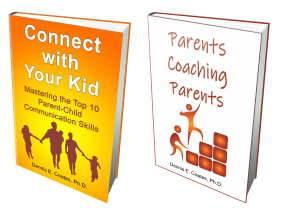A common consequence of parenting an adolescent child: the alienated teen. It’s natural for a growing child to seek more independence. After all, becoming an adult and creating a happy, successful life of their own is the goal.
But you want your child to remain open to your guidance along the way. You don’t want them to rebel and cut you off. The problem is, the instinctive way parents react to mistakes, conflicts, and differences of opinion puts kids off. Asserting your superior knowledge, financial advantage, and authority can make them feel unappreciated, misunderstood, disrespected, and resentful. And so they turn away from your influence and seek the counsel of their peers, who know very little about life.
It’s an old story.
So much depends on how you talk to your child. But very few parents have had the opportunity to learn high-impact communication skills. This is why I wrote the book, Connect with Your Kid, a how-to guide for the acquiring the 10 most important parent-child communication skills.
To replace the pattern of reacting emotionally to teen behavior with high-impact communication skills, you first need to acknowledge 10 related facts:
- Knowing what to do isn’t the same as being able to do it in the heat of the moment.
- You need to be able to respond with the skill automatically. Most of the time you won’t have time to think about the situation and decide what to do.
- Like building any skill–you need practice, practice, and more practice–applying it repeatedly over time to stimulate the brain cells involved in the skill to grow together to form a circuit that allows you to respond automatically.
- The key is to focus on one skill at a time until it becomes comfortable.
- The best approach is to begin with listening. Listening to understand has a powerful impact, and it’s a component of several other important communication skills.
- Once listening becomes your habitual response, you can focus on improving another key skill.
- On the way to success, you will sometimes miss opportunities or perform the skill awkwardly. Too much frustration and discouragement can cause a parent to give up.
- The key to working through frustration is meeting regularly with a coach to hear you out, encourage you, and hold you accountable.
- Many parents can’t afford to work with a professional parent coach. For them, two parents coaching each other while they work on a skill is a splendid option.
- Success depends on being patient and persistent. Think of it as a long-term learning adventure. And don’t give up.
Along the way your coach may encourage you to refresh your awareness of the fundamentals of a skill. That’s the job of these guides:
Connect with Your Kid: Mastering the Top 10 Parent-Child Communication Skills, along with Parents Coaching Parents, will help you strengthen the bond with your child.


